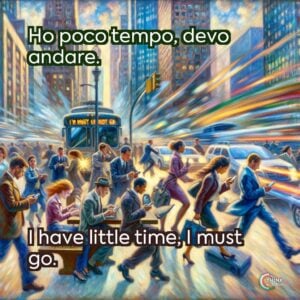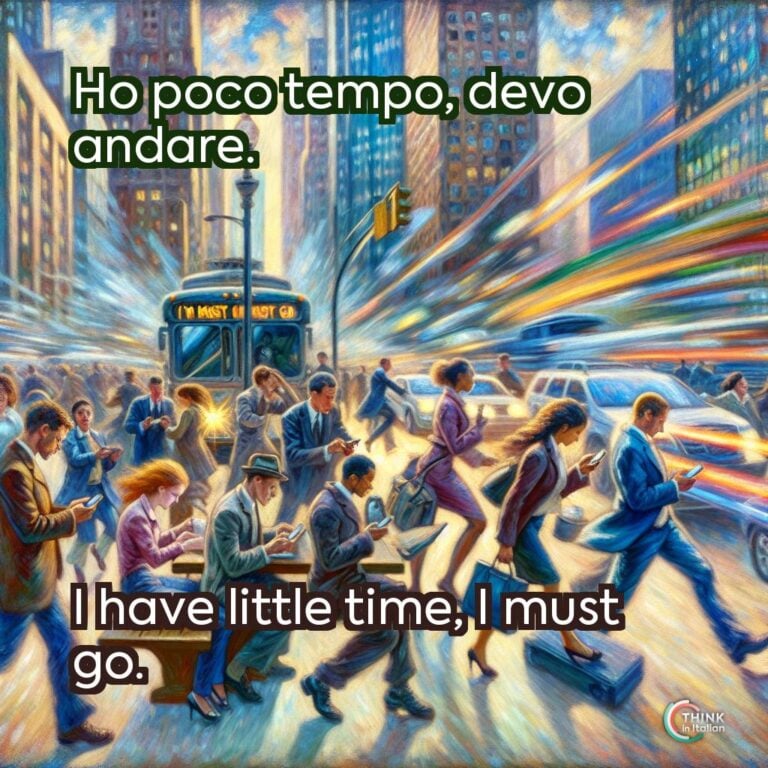Mastering Italian Irregular Verbs and Their Conjugations
What are Irregular Verbs
In linguistics, a verb is considered irregular if it does not follow the typical conjugation patterns of its language. This means that its forms cannot be predicted by applying the standard rules that apply to regular verbs.
If you are learning Italian and find irregular verbs tricky do not worry: it is because they do not follow the standard conjugation patterns of Italian verb conjugations.
For this reason, Italian irregular verbs must be learned by heart, and interesting enough, there is a scientific explanation behind it.
There are two main types of long-term memory that comes into play when learning a language: procedural memory and declarative memory.
- Procedural memory allows to automatically use language without having to think about every step. It makes using grammar correctly, pronouncing words right, and using phrases naturally much smoother.
- Declarative memory allows you to remember specific information about the language, such as remembering words and what they mean, that is, the language vocabulary.
When it comes to learning irregular words, you will be using the declarative part of your memory, because you have to learn that a certain word has a certain form no matter what.
Characteristics of Irregular Verbs
Irregularities can occur in one or more tenses of the verb. Therefore, some verbs are irregular in certain tenses and not all are irregular in the same tense. The reason is because they retain forms from Latin, where Italian evolved from.
Learn more about the history of the Italian language and its evolution.
Here, I will explore the conjugations of some of the most common irregular verbs in Italian: essere, avere, andare, fare, venire, dire, stare, potere, volere, and dovere.
It is not a coincidence that almost all of these verbs are auxiliary verbs. In fact, let me tell you an interesting linguistic fact I love sharing with my students: all irregular verbs in all languages are very commonly used verbs.
Now that you have some linguistic knowledge you can guess why: they are so commonly used that it makes it easier to remember them! Fascinating, right?
Most Common Italian Irregular Verbs
“Essere” – To Be
Essere is highly irregular across multiple tenses, including the present, future, past perfect, subjunctive present and imperfect, and conditional tenses.
| Tense | Io | Tu | Lui/Lei | Noi | Voi | Loro |
|---|---|---|---|---|---|---|
| Present | sono | sei | è | siamo | siete | sono |
| Future | sarò | sarai | sarà | saremo | sarete | saranno |
| Past Perfect | sono stato | sei stato | è stato | siamo stati | siete stati | sono stati |
| Subjunctive Present | sia | sia | sia | siamo | siate | siano |
| Subjunctive Imperfect | fossi | fossi | fosse | fossimo | foste | fossero |
| Conditional | sarei | saresti | sarebbe | saremmo | sareste | sarebbero |
“Avere” – To Have
Avere is irregular in the present, future, past perfect, subjunctive present, and conditional tenses.
| Tense | Io | Tu | Lui/Lei | Noi | Voi | Loro |
|---|---|---|---|---|---|---|
| Present | ho | hai | ha | abbiamo | avete | hanno |
| Future | avrò | avrai | avrà | avremo | avrete | avranno |
| Past Perfect | ho avuto | hai avuto | ha avuto | abbiamo avuto | avete avuto | hanno avuto |
| Subjunctive Present | abbia | abbia | abbia | abbiamo | abbiate | abbiano |
| Conditional | avrei | avresti | avrebbe | avremmo | avreste | avrebbero |
“Andare” – To Go
Andare is irregular in the present, future, subjunctive present and imperfect, and conditional tenses.
| Tense | Io | Tu | Lui/Lei | Noi | Voi | Loro |
|---|---|---|---|---|---|---|
| Present | vado | vai | va | andiamo | andate | vanno |
| Future | andrò | andrai | andrà | andremo | andrete | andranno |
| Subjunctive Present | vada | vada | vada | andiamo | andiate | vadano |
| Conditional | andrei | andresti | andrebbe | andremmo | andreste | andrebbero |
“Fare” – To Do/Make
Fare is irregular in the present, future, subjunctive present and imperfect, and conditional tenses.
| Tense | Io | Tu | Lui/Lei | Noi | Voi | Loro |
|---|---|---|---|---|---|---|
| Present | faccio | fai | fa | facciamo | fate | fanno |
| Future | farò | farai | farà | faremo | farete | faranno |
| Subjunctive Present | faccia | faccia | faccia | facciamo | facciate | facciano |
| Subjunctive Imperfect | facessi | facessi | facesse | facessimo | faceste | facessero |
| Conditional | farei | faresti | farebbe | faremmo | fareste | farebbero |
“Venire” – To Come
Venire is irregular in the present, future, subjunctive present and imperfect, and conditional tenses.
| Tense | Io | Tu | Lui/Lei | Noi | Voi | Loro |
|---|---|---|---|---|---|---|
| Present | vengo | vieni | viene | veniamo | venite | vengono |
| Future | verrò | verrai | verrà | verremo | verrete | verranno |
| Subjunctive Present | venga | venga | venga | veniamo | veniate | vengano |
| Conditional | verrei | verresti | verrebbe | verremmo | verreste | verrebbero |
“Dire” – To Say/Tell
Dire is irregular in the present, future, subjunctive present and imperfect, and conditional tenses.
| Tense | Io | Tu | Lui/Lei | Noi | Voi | Loro |
|---|---|---|---|---|---|---|
| Present | dico | dici | dice | diciamo | dite | dicono |
| Future | dirò | dirai | dirà | diremo | direte | diranno |
| Subjunctive Present | dica | dica | dica | diciamo | diciate | dicano |
| Subjunctive Imperfect | dicessi | dicessi | dicesse | dicessimo | diceste | dicessero |
| Conditional | direi | diresti | direbbe | diremmo | direste | direbbero |
“Stare” – To Stay/Be
Stare is irregular in the present, future, subjunctive present and imperfect, and conditional tenses.
| Tense | Io | Tu | Lui/Lei | Noi | Voi | Loro |
|---|---|---|---|---|---|---|
| Present | sto | stai | sta | stiamo | state | stanno |
| Future | starò | starai | starà | staremo | starete | staranno |
| Subjunctive Present | stia | stia | stia | stiamo | stiate | stiano |
| Subjunctive Imperfect | stessi | stessi | stesse | stessimo | steste | stessero |
| Conditional | starei | staresti | starebbe | staremmo | stareste | starebbero |
“Potere” – Can/To Be Able To
Potere is irregular in the present, future, subjunctive present and imperfect, and conditional tenses.
| Tense | Io | Tu | Lui/Lei | Noi | Voi | Loro |
|---|---|---|---|---|---|---|
| Present | posso | puoi | può | possiamo | potete | possono |
| Future | potrò | potrai | potrà | potremo | potrete | potranno |
| Subjunctive Present | possa | possa | possa | possiamo | possiate | possano |
| Conditional | potrei | potresti | potrebbe | potremmo | potreste | potrebbero |
“Volere” – To Want
Volere is irregular in the present, future, subjunctive present and imperfect, and conditional tenses.
| Tense | Io | Tu | Lui/Lei | Noi | Voi | Loro |
|---|---|---|---|---|---|---|
| Present | voglio | vuoi | vuole | vogliamo | volete | vogliono |
| Future | vorrò | vorrai | vorrà | vorremo | vorrete | vorranno |
| Subjunctive Present | voglia | voglia | voglia | vogliamo | vogliate | vogliano |
| Conditional | vorrei | vorresti | vorrebbe | vorremmo | vorreste | vorrebbero |
“Dovere” – Must/To Have To
Dovere is irregular in the present, future, subjunctive present and imperfect, and conditional tenses.
| Tense | Io | Tu | Lui/Lei | Noi | Voi | Loro |
|---|---|---|---|---|---|---|
| Present | devo | devi | deve | dobbiamo | dovete | devono |
| Future | dovrò | dovrai | dovrà | dovremo | dovrete | dovranno |
| Subjunctive Present | debba | debba | debba | dobbiamo | dobbiate | debbano |
| Conditional | dovrei | dovresti | dovrebbe | dovremmo | dovreste | dovrebbero |
Irregularities Won’t Stop you
Mastering the conjugations of irregular verbs in Italian is a key step towards fluency. Regular practice with these verbs in different tenses will help you become more comfortable and confident in using them.
Keep practicing Italian verb tenses and do not hesitate to seek for help when it becomes to tricky!
Buona fortuna! (Good luck!)






